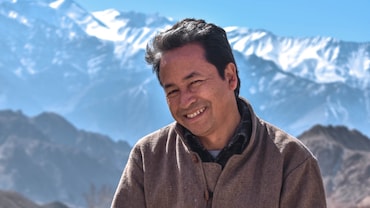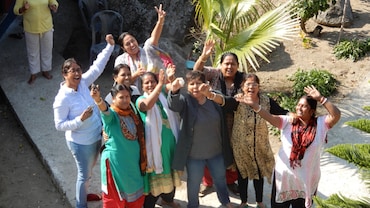- HOME
- /
- Features
- /
- Classic Reads
- /
Why God Saved Anna Hazare
The humble, yet remarkable, origins of the man who became the people’s champion against corruption and injustice in India
 Photograph: Ramesh Sharma
Photograph: Ramesh Sharma
Kemkharan, September 1965. An Indian military convoy rumbles towards the fighting zone. Suddenly,two Pakistani Sabre jets dropped out of the sky and scream in to attack. As bombs begin exploding around him, Kishan Baburao Hazare, driving a truckful of soldiers, speeds up. But when a splinter grazes his forehead, he ducks below the dashboard and jams on the brakes with his hands. The windscreen shatters and bullets riddle the man next to Hazare. The 25-year-old driver tumbles out of his truck and prays fervently as the two Sabers strafe the convoy again. When they finally disappear, dozens of jawans lie dead.Of the few survivors, only Hazare escapes serious injury. “You saved me, God,” Hazare says over and over again. “But why?”
Recently, at the village of Ralegaon Shindi, I discovered why God savedBaburao Hazare 11 years ago. RalegaonShindi wasn’t very different from hundreds of other villages in this arid part of Maharashtra’s Ahmadnagar district.With water available only during the monsoons, its farmers could barely grow one crop a year, and 70 per cent of the village’s 315 families lived in abject poverty. Indeed, Ralegaon Shindi’smost distinctive feature was its 40 illicit distilleries that made the village a popular haunt for drunks and gamblers.Thefts and brawls were commonplace.
Since he returned to Ralegaon Shindiin 1975, Hazare has spearheaded a movement that has changed all this forever. Today, Ralegaon Shindi is brisk and prosperous, signs of rural modernity abound. Its fields are heavy with grain. There’s a bank, a boarding school,biogas plants. Some of its farmers drive around on mopeds.
Even more remarkable is the social transformation that Hazare has wrought. No one drinks in Ralegaon Shindi, only a handful smoke. There hasn't been a crime here in nine years.Even the practice of ‘untouchability’ has weakened, thanks to Hazare, says the former collector of Ahmannagar, Rajiv Agarwal. Scores of other villages here and in neighbouring districts look toRalegaon for inspiration.
It’s hard to believe that Hazare could be responsible for all this. He’s a short,thin, mild-looking fellow, the kind of person you wouldn’t look at twice. Nor is his background the stuff from which leaders are supposed to be made. The son of a poor farmer, Hazare never got beyond the seventh class in school. As a young man, his fiery temper constantly got him into trouble: once he had the Bombaypolice after him when he beat up a cop who had been harassing hawkers.
He was known as a troublemaker in the army, too. Soon after he enlisted,he discovered that a senior officer was embezzling mess funds. He publicly questioned the officer and was posted to far-off Nefa [now, Arunachal Pradesh]as a punishment.
COMPLETE CHANGE
The story of Hazare’s transformation began in 1964 at a Delhi railway station bookstall after he bought a book on Swami Vivekananda.Enthralled by the great sage's life and by his dictum that the noblest thing a man can do is work for the good of others, Hazare avidly began reading religious texts and biographies of social reformers, and after his escape from the Saber jets at Khemkharan, Hazare became a vegetarian, gave up cigarettes and liquor and vowed to remain a bachelor, devoting himself to public service.
A worthy cause, he realized, lay right in front of him. The upliftment of his own village, Ralegaon Shindi. During his annual visits home, Hazare had been appalled by its steady deterioration. Even the village temple had become badly run down. If I could rebuild the temple, Hazare said to himself, more people might think of God and lead better lives. But he didn't have the money. Nor could he leave the army just yet—to qualify for a pension,he had to serve for several years more.
Finally, in August 1975, Hazarereturned to Ralegaon after retiring from the army. His service benefits amounted to `20,000, and he planned to spend the money rebuilding the village temple.He hired carpenters and Masons and helped them lay bricks and lug wood.Few people paid him attention at first,but as the temple neared completion, the villages began changing. Some offered to donate wood.Many volunteered their labour. “This taught me one thing,” Hazare says.“If people are convinced that you are not selfish,they are on your side.”
BORN LEADER
Among those who joined Hazare were a few young men.They called him anna (big brother) and listened with fascination to his dream of transforming their village. Gradually,poor youth joined the group, and Hazare suggested they form a Tarun Mandal(youth club). One night, a few Tarun Mandal members rushed to the temple with the news that some drunks from a neighbouring village had beaten up Gulab Bhalekar, a 40-year-old Ralegaon farmer, because he had not saluted them. Anna seized the opportunity to call a village meeting, at which he lashed out against drinking, illicit distilling and gambling. “I’m warning all distillers here,” he said. “Shut up shop.”
Some distillers, fearing Anna and his boys, readily complied. Others had their liquor dens smashed up. But Hazare was not content with simply putting an end to the liquor distilling.“You can drink elsewhere,” he told villagers. “But if anyone here is found drunk, he’d better watch out.”
He soon proved as good as his word. A few days later, when three men returned to Ralegaon drunk after a binge in a nearby village, Hazare had them tied to the temple pillars and personally flogged them with his army belt. Even today, Hazare is unfazed by criticism of such behaviour. “Rural India is a harsh society,” he says. “If you want change,it’s sometimes necessary to be tough.”Indeed, no one I met in Ralegaon holds Hazare’s harshness against him. “I was a miserable drunk nine years ago,”says 44-year-old Haribhau Mapari, a Ralegaon farmer. “But after being thrashed,I have not touched a drop of liquor.Anna saved me.”
Though drink had blighted the lives of Ralegaon Shindi residents, Hazare soon realized that a far more important reason for the villager’s misery was lack of work. In fact, because many of the villagers had worked for the bootleggers, shutting down the distilleries had, ironically, made several families even poorer.As he wondered what could be done,Hazare chanced upon a newspaper article about a state government scheme that provided manual labour jobs on public works and projects. He and the Tarun Mandal boys quickly rounded up about 200 villagers who needed work and got jobs for all of them.
PERSISTENT PAYS
This taught Hazare another important lesson. The government runs a number of rural development schemes, but because they are poorly publicized, illiterate villagers rarely get to hear about them. By finding out what schemes existed and studying them carefully,Hazare could help villagers take advantage of them. Accordingly, Hazare decided to find out as much as he could about the development projects. He haunted government offices, talked to every bureaucrat he could, read several newspapers, and built up files on government development schemes.“He was extraordinarily persistent,” recallsM. D. Sukhatame,executive engineer in Ahmadnagar’s irrigation Department. “I remember him at one meeting, sitting on the floor, listening intently to a technical discus-sion on water management.”
Since Ralegaon suffered from acute water scarcity, Hazare was especially interested in irrigation techniques.Reading about a successful water conservation project near Purandhar, about100 km away, Anna studied their system and got engineers to draw up plans for a similar facility at Ralegaon and by persuading villagers to do much of the work themselves, he got the facilities built at the lowest possible cost. “Building the temple had taught villagers the benefits of working together,” says Hazare. “Since then,shramdan (self-help)has been our way of life.”Today, 41 per cent of Ralegaon Shindi house farmland is irrigated,agricultural incomes have increased five-fold, and only 30 percent of the population still lives below the poverty line. Not only have living standards risen, dozens of villagers are now free of debt. “Four years ago,” farmer Nana Auti told me proudly,“I was able to pay back `40,000 in debts that I had accumulated over the years.Since then, I’ve also built a new house.”
Ralegaon’s self-help efforts are not always looked upon kindly. Once, after the villagers decided they wanted a high school and constructed a 10-room building themselves, the government refused to provide money for running it. Anna soon discovered the reason. A powerful local politician, annoyed because he received no votes in Ralegaon in a recent election, was taking revenge.
TOTAL DEDICATION
Hazare, however, was undeterred. He hired 10 teachers, offered them free food and housing in lieu of wages, and got the school going. Then he systematically began to lobby officials both at district headquarters in Ahmednagar and at the state secretariat in Bombay,350 km away. To keep expenses down during his Bombay trips, Hazareslept on newspapers spread out on bus-station floors, and bathed in the sea. But for one year, despite 20 visits to Bombay and innumerable more to Ahmednagar,nothing happened.“Finally,” Hazare says, “I decided I’d had enough.”He descended on a Ahmednagar’s Zilla Parishad office one morning with 250 villagers and announced that they are all going on a hunger strike. Within hours,officials in Bombay sent an assurance that the money would be made available.Today, the school is run on military lines. “That’s where I learnt some discipline,” says Hazare. Students have to jog and exercise daily and take extra courses in English, which, insists Hazare, who knows very little of the language itself, is essential to understand modern science.
Hazare has tried to modernize age old social customs, too. The RalegaonTarun Mandal organizes group marriages twice a year. Nobody has to spend more than 1,000; poor families don’t have to pay anything at all. Ralegaongroup weddings have become so popular that even girls from neighbouring villages are sometimes married off there.
Untouchability, too, is beginning to lose its force in Ralegaon. Today, the village's Harijans share the community water tanks with caste Hindus and eat with them at the group marriages at the village's annual cattle festival. It’s now a convention to give Harijan bullocks the pride of place.
All such progress, Hazare believes,must be based on a deep religious faith.Today, as in the very beginning, the village temple is the heart of Hazare’smovement. Anna himself lives there in a small room covered with files and documents. All-day long, the temple is crowded with people attending prayer sessions, religious discourses, and meetings. The changes in Ralegaon’s have stimulated people in neighboring areas to do something about their villages,too. Raghunath Thange, 29,recently gave up his headmaster's job at a high school near Ahmadnagar and is now engaged in closing down distilleries in villages.“We are following in Anna’s footsteps,” he says. “Thanks to him, we know what to do.”Anna wants a lot more for Ralegaon—water to irrigate the entire village around the year, biogas for every family, a college, industries that will keep Ralegaon educated youth from leaving the village.As always, he rarely has a spare moment,especially now with people from other villages coming to him constantly to discuss their problems or to invite him to address public functions. While I was with him, two Muslims from neighbouring Sirur town wanted him to talk at a meeting celebrating the Prophet’s birthday. Anna accepted readily. When they left, he told me, “I don’t know much about the Prophet, but I’ll give them my message—that to change our nation, we have to change our villages and to do that, we have to change ourselves.
Update: Anna Hazare went on to focus his activism to push for greater government accountability. He established the People's Movement Against Corruption in 1991, and led a successful campaign for a ‘right to information law in 1997. His July 2003‘ fast unto death, led the Maharashtra government FROM 1986 to enact a draft legislation.He later earned nationwide recognition for an indefinite hunger strike in April 2011 to protest the perceived weakness of the Jan Lokpal Bill (or Citizen’s Ombudsman Bill),as part of the India Against Corruption movement.






